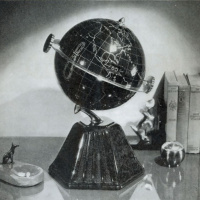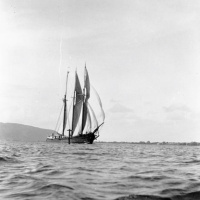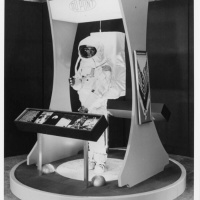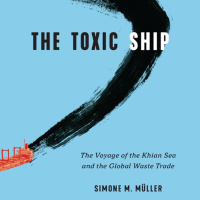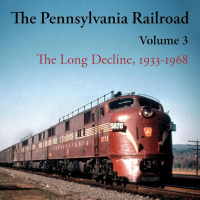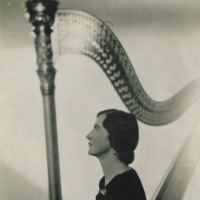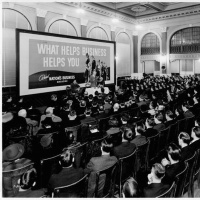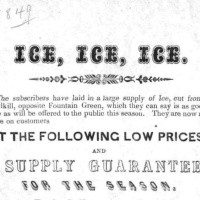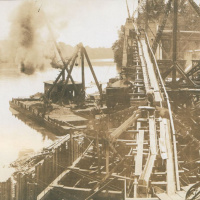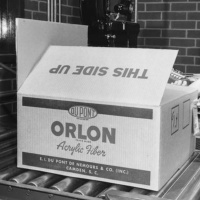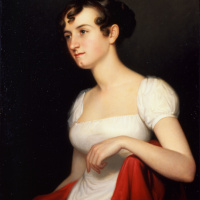Sinopsis
Podcast by Hagley Museum and Library
Episodios
-
For an 'Orderly' Globalization: Managed Liberalization in US Labor, 1945-1990 with Melanie Sheehan
01/09/2025 Duración: 23minAmerican labor unions struggled to adjust to the changing dynamics of the world economy during the mid-to-late twentieth century. Charting this complex process is Dr. Melanie Sheehan, assistant professor of history at Hartwick College and recent Hagley-NEH postdoctoral fellow. Sheehan has discovered that during the post-WWII moment, union economists supported trade liberalization as a means of multiplying the comparative advantages enjoyed by U.S. producers and exporters so long as it was accompanied by aid to impacted industries and displaced workers. However, while trade liberalization proceeded apace, and foreign competition rapidly gained ground against American made goods, the planned and hoped-for aid failed to materialize. This forced unions to reassess their commitment to liberal trade policies, as their industries, first textiles, then steel, and finally automotives, faced the implications of increasingly efficient foreign competition. In support of her work Dr. Sheehan received funding from the C
-
The Power of Patents: Global Intellectual Property, 1880-1950 with Joël Praz
18/08/2025 Duración: 22minBuilding international cooperation is a slow, painstaking process, one made more difficult when some people don’t see the need for it. To businesses, however, international cooperation is positively necessary as a means to secure intellectual property rights, market share, and profit opportunities. In his dissertation research, Joël Praz, PhD student at the École Polytechnique Fédérale de Lausanne, is uncovering the significance of the Paris Convention for the Protection of Industrial Property, an international patents union today administered by the World Intellectual Property Organization in Geneva, Switzerland. Using numerous collections held in the Hagley Library, Praz has found that private businesses in the United States began to value international cooperation around patent law increasingly after the Second World War. In support of his work Praz received funding from the Center for the History of Business, Technology, and Society at the Hagley Museum and Library. For more information and more Hagley
-
Instrument of War: Music and the Making of America’s Soldiers with David Suisman
03/08/2025 Duración: 01h13minOur previously scheduled episode featuring Alessandra La Rocca Link has been postponed. In lieu of which, we present this recording made during the Hagley Author Talk featuring David Suisman hosted on February 27th, 2025 by the Hagley Museum and Library. Suisman discusses his latest book, "Instrument of War: Music and the Making of America's Soldiers." From the publisher: "Since the Civil War, music has coursed through the United States military. Soldiers have sung while marching, listened to phonographs and armed forces radio, and packed the seats at large-scale USO shows. “Reveille” has roused soldiers in the morning and “Taps” has marked the end of a long day. Whether the sounds came from brass instruments, weary and homesick singers, or a pair of heavily used earbuds, where there was war, there was music, too. Instrument of War is a first-of-its-kind study of music in the lives of American soldiers. Although musical activity has been part of war since time immemorial, the significance of the US milit
-
Afro-Andean Sailors and Shipbuilders in Spanish America and the Black Pacific with Leo Garofalo
21/07/2025 Duración: 21minWhile popular memory may have forgotten them, about half of the sailors, soldiers, missionaries, tradesmen, and colonists that made up the Spanish Empire were black, people who were part of the African diaspora. Studying their history allows scholars new ways to research and interpret Spanish colonialism, perhaps especially in the Pacific context. Dr. Leo Garofalo, Virginia Eason Weinmann 1951 Professor of History at Connecticut College, is laying the foundation for generations of new research on the Black Pacific. In his work on Afro-Andeans he has illuminated the central role played by the black people of Spanish Peru in the expansion of Iberian power across the Pacific Ocean. As skilled sailors and shipbuilders they built and operated the ships, charted the routes, and advanced the missions that formed the very marrow of imperial might. Focus on the African diaspora as it emanated across the Atlantic and Indian oceans accompanying and staffing Iberian imperial projects, underscores the intersection of the
-
A Stretch of the Imagination: Synthetic Fabrics and the Cold War with Monica Geraffo
07/07/2025 Duración: 20minDuring the Cold War, rival superpowers the USA and the USSR vied with one another for world dominion in many arenas: military, diplomatic, and even haute coture. In the latter connection, French designers played arbiter, judging the synthetic textiles developed under capitalist and communist systems for their value in fashion. In her dissertation project, Monica Geraffo, PhD candidate at the University of California at Los Angeles, discovers why synthetic textiles played such a central role in the Cold War rivalry between political blocs. Using the extensive DuPont company records held in the Hagley Library, Geraffo highlights the shared interests of chemical firms, fashion houses, and political leaders, which aligned around synthetic textiles in the Cold War context. In support of her research, Geraffo received funding from the Center for the History of Business, Technology, and Society at the Hagley Museum and Library. For more information and more Hagley History Hangouts, visit us online at hagley.org.
-
Plebian Consumers: Foreign Goods in Nineteenth-Century Colombia with Ana Maria Otero-Cleves
23/06/2025 Duración: 37minIn this interview with Roger Horowitz, Ana Maria Otero-Cleves discusses the place of important objects in her book Plebian Consumers, especially textiles, machetes, and patent medicine. Otero-Cleves also elaborates on the crucial importance of Hagley’s Lanman and Kemp collection due to its extensive correspondence with Colombian merchants in the late 19th century to obtain supplies for its patent medicines. From the publisher: “Plebeian Consumers is both a global and local study. It tells the story of how peasants, day workers, formerly enslaved people, and small landholders became the largest consumers of foreign commodities in nineteenth-century Colombia, and dynamic participants of an increasingly interconnected world. By studying how plebeian consumers altered global processes from below, Ana María Otero-Cleves challenges ongoing stereotypes about Latin America's peripheral role in the world economy through the nineteenth century, and its undisputed dependency on the Global North. By exploring Colombians
-
The Toxic Ship: The Voyage of the Khian Sea and the Global Waste Trade with Simone M. Müller
09/06/2025 Duración: 32minIn this episode of the Hagley History Hangout we interview Simone M. Muller, professor of global environmental history at the University of Augsburg and author of the Hagley Award-winning book The Toxic Ship: The Khian Sea and the Global Waste Trade. From the publisher: “An infamous voyage explores the hazardous waste trade and environmental justice - In 1986 the Khian Sea, carrying thousands of tons of incinerator ash from Philadelphia, began a two-year journey, roaming the world's oceans in search of a dumping ground. Its initial destination and then country after country refused to accept the waste. The ship ended up dumping part of its load in Haiti under false pretenses, and the remaining waste was illegally dumped in the ocean. Two shipping company officials eventually received criminal convictions. Simone M. Müller uses the Khian Sea's voyage as a lens to elucidate the global trade in hazardous waste—the movement of material ranging from outdated consumer products and pesticides to barges fille
-
The Long Shadow of Kodak: Markets and Science in Twentieth Century Photography with Joris Mercelis
26/05/2025 Duración: 25minKodak enjoyed dominance over the international photography market for much of the twentieth century. Part and parcel of that success was dominance over the science of photography, achieved and maintained by a worldwide network of research laboratories. In his latest research Joris Mercelis, assistant professor at Johns Hopkins University, finds that the international network of Kodak research laboratories had two primary functions. In the shorter term their function was problem solve the tricky process of manufacturing photographic film in the different environmental conditions prevailing in different world regions, a process that proved difficult to standardize. In the longer term, and perhaps more significantly, Kodak laboratories conducted novel and cutting-edge research into the fundamentals and applications of photographic science. In support of his work Dr. Mercelis received funding from the Center for the History of Business, Technology, and Society, including a NEH-Hagley postdoctoral fellowship.
-
Smoking Gun: How Consumerism & Community Made an American Gun Culture 1870-1920 with Courtney Slavin
11/05/2025 Duración: 36minAmericans, understandably, have an emotionally fraught relationship with firearms, and American gun culture bears the marks of this emotional complexity. When, and perhaps more important, why did the firearm, a tool for killing, come to bear this unique cultural baggage in America? Between 1870 and 1920, when firearms were no longer seen as a tool first, but a consumer good laden with symbolic meaning and community associations. So argues Courtney Slavin, PhD candidate at Clark University, in her dissertation project. Using a combination of primary sources, including business records, catalogs, and consumer correspondence, all held in the Hagley Library collections, Slavin reconstructs a time when Americans began thinking about and using guns less as functional firearms and more as symbols. Fitting into a cultural milieu of anxiety over masculinity, fears of over civilization, perceived loss of tradition and community, guns accreted a load of cultural meanings atop of and around their physical objects. The
-
The Pennsylvania Railroad: The Long Decline, 1933-1968 with Albert Churella
28/04/2025 Duración: 03h16minHagley’s Ben Spohn interviews Albert Churella about the final volume in his landmark trilogy on the history of the Pennsylvania Railroad. From the publisher: “The final volume of Albert J. Churella's landmark series, The Pennsylvania Railroad, concludes the story of the iconic transportation company, covering its long decline from the 1930s to its merger with the New York Central Railroad in 1968. Despite some parallels with World War I, the experience of World War II had a substantially different impact on the Pennsylvania Railroad. The introduction of new technologies, personnel, and commuter routes had significant effects on this giant of American transportation. The recession of 1958 sparked a period of decline from which it and many other railroads struggled to fully recover. The Pennsylvania Railroad: The Long Decline, 1933-1968 provides an unparalleled look at the final years of this legendary company, which in its prime was the largest corporation in the world, with a budget second only to that o
-
Sound & Music in the du Pont Women's World in the Age of Revolution with Rebecca Geoffroy-Schwinden
14/04/2025 Duración: 22minWhere can you find music in the archive? Everywhere, if you know how to look. So argues our guest musicologist Rebecca Geoffroy-Schwinden, associate professor at the University of North Texas and former NEH-Hagley postdoctoral fellow. In this episode, Dr. Geoffroy-Schwinden discusses her latest book project about amateur music making in the Francophone world during the Age of Revolution. Her particular focus is on the meaning of music in the private lives of women around the Atlantic world, women like those in the du Pont family. When Geoffroy-Schwinden delved into the archive she was stunned and delighted to find music everywhere, hidden in plain sight. In support of her work Geoffroy-Schwinden received funding from the Center for the History of Business, Technology, and Society at the Hagley Museum and Library. For more Hagley History Hangouts, and more information on our research funding opportunities, please visit us at Hagley.org.
-
International Business Associations & Regulations on Multinational Corporations with Maia Müller
31/03/2025 Duración: 22minThe mid-twentieth century emergence of multinational corporations wealthier and more powerful than many nations presented a problem for organizations tasked with overseeing international cooperation and development. How to create a regulatory framework around multinationals that would protect the interests of disadvantaged peoples and regions, while not limiting the ability of multinational corporations to deliver economic development. In turn, international business associations reacted to this push toward regulation with a well-organized opposition. In her dissertation research, Maia Müller, PhD candidate at the University of Lausanne, examines the role of business associations in the struggle over regulation of multinational corporations between the 1960s and 1990s. These powerful lobbying organizations provided a unified and legitimizing voice advocating for the perceived interests of the business community, one increasingly dominated by multinational corporations. Her transnational study reveals the sec
-
On Ice: America's Nineteenth-Century Ice Age and the Making of Modern Life with Andrew Robichaud
17/03/2025 Duración: 32minIce, ice, baby. In nineteenth-century America ice was everywhere. Extracted from northern ponds and shipped around the world, ice became a valuable commodity and a vital input in numerous industries. In his latest research Dr. Andrew Robichaud, Associate Professor of History at Boston University, explores the ice industry in nineteenth-century America and its many and complex impacts. From fruit to beer, from cattle carcasses to human cadavers, American ice had its role to play. In support of his work, Dr. Robichaud received funding from the Hagley Center for the History of Business, Technology, and Society at the Hagley Museum and Library. For more information, and more Hagley History Hangouts, join us online at Hagley.org.
-
Analog Superpowers: Technology Theft and the National Security State with Kate Epstein
03/03/2025 Duración: 45minRoger Horowitz talks with Katherine Epstein about her new book Analog Superpowers: How Twentieth-Century Technology Theft Built the National Security State (University of Chicago Press, 2024). From the publisher: “A gripping history that spans law, international affairs, and top-secret technology to unmask the tension between intellectual property rights and national security. At the beginning of the twentieth century, two British inventors, Arthur Pollen and Harold Isherwood, became fascinated by a major military question: how to aim the big guns of battleships. These warships—of enormous geopolitical import before the advent of intercontinental missiles or drones—had to shoot in poor light and choppy seas at distant moving targets, conditions that impeded accurate gunfire. Seeing the need to account for a plethora of variables, Pollen and Isherwood built an integrated system for gathering data, calculating predictions, and transmitting the results to the gunners. At the heart of their invention was th
-
The Nature of War: Environment and Industry in the U.S. During WWI with Gerard Fitzgerald
17/02/2025 Duración: 26minFar from the battlefield the First World War spurred a massive increase in industrial output in the United States. Arms and armaments, ships and steel, a vast stream of materiel poured from American factories, mines, and mills to feed the insatiable maw of war. The consequent strain placed on American railroad infrastructure left it vulnerable to environmental disruption, such as that caused by the great blizzard of 1916-17. These developments marked a significant chapter in the environmental history of American industry. In this episode of the Hagley History Hangout we chat with Gerard Fitzgerald, visiting fellow at the Greenhouse Center for Environmental Humanities at the University of Stavanger and lecturer in the Department of Engineering and Society at the University of Virginia, whose latest research considers the environmental context of industrialization in the United States during World War One. In support of his work Fitzgerald has received funding from the Center for the History of Business, Te
-
Securing the System: Phone Phreaks, Hackers, and Political Order, 1963-2013 with Jacob Bruggeman
06/01/2025 Duración: 31minLarge technological systems can be vulnerable to manipulation, perhaps especially when they are centralized, monopolistic, and complacent. That was the situation in American telecommunications in the early 1960s when a generation of hackers developed techniques to manipulate the Bell telephone system to their advantage, a practice known as phone phreaking. In his dissertation research, Jacob Bruggeman, PhD candidate at the Johns Hopkins University, digs into the technology and politics of hackers, tracing their trajectory from anti-establishment actors on the fringes of technological systems, to positions of influence and control over the very same systems. In parallel to these developments in the hacker community, major organizations, both public and private, adopted new positions and policies designed to secure the system. In support of his research, Bruggeman received funding from the Center for the History of Business, Technology, and Society at the Hagley Museum and Library. For more information, and
-
Racial Economies of Early Jazz with Stephanie Doktor
23/12/2024 Duración: 28minWhat is jazz and when did it begin? Music scholars do not agree. Taking an archival perspective, however, clarifies the dilemma and allows us to see jazz where people at the time performed, recorded, consumed, and discussed what they thought of as jazz music. The emergence of jazz as an economic force, and a defining cultural aspect of an era, were tightly bound up in the prevailing system of racism, segregation, and inequality in the early twentieth-century United States. In her latest book project, Stephanie Doktor, assistant professor of Music Studies at Temple University, explores the racial context within which the jazz recording industry developed, and the indelible mark left by the systemic racism of the period upon the music industry to the present day. Using the Victor-RCA records held in the Hagley Library, Dr. Doktor reveals how race, class, and gender mutually shaped the political economy of early jazz. In support of her work, Dr. Doktor received funding from the Center for the History of Busin
-
Management as Design: Industrial Designers and Business Culture with Penelope Dean
09/12/2024 Duración: 24minTracing the circulation of ideas can cast light on patterns of interaction between various people and institutions in the past. During the mid-late twentieth century, a circuit of ideas linked business culture, industrial designers, academia, and related professional organizations. The movement of values, techniques, and perspectives between these distinct but interpenetrative spaces illuminates how they related to one another in historical context. In her latest research Penelope Dean, professor of architecture at the University of Illinois at Chicago, uncovers this movement of ideas and uses it to bring business and design histories into conversation. Using numerous collections held in the Hagley Library, including the Raymond Loewy and Ernest Dichter collections, Dean identifies the spread of ideas between business and design, and the development of a shared language capable of communicating complex concepts across professional groups. In support of her work Dr. Dean received funding from the Center for
-
Plasticizing China: A Cultural History of Everyday Things, 1960-1990 with Yaxi Liu
04/12/2024 Duración: 19minChinese plastic is cheap and abundant. It wasn’t always. The ubiquity of plastic in twenty-first century consumer culture belies its past rarity and the many cultural meanings it has borne over time. How did plastic come to play such a central role in the economy of China? In her dissertation research Yaxi Liu, PhD candidate at the University of Oxford, reveals the story of plastic’s introduction to the Chinese market and the varied political and cultural meanings assigned to plastic in China. The first plastic introduced to China was acrylic fiber. The technology transfer necessary derived from Britain and from Dupont in the USA. The state reserved for itself a monopoly on plastic production for decades, and the material gained a reputation for scarcity and luxury. Following the emergence of plastic recycling and secondary manufacturing in rural districts, the material came to be associated with cheapness and low status. The Center for the History of Business, Technology, and Society supports research in
-
“Keep Within Compass”: Geographies of Girlhood in the American South, 1783-1865 with Emily Wells
02/12/2024 Duración: 22minThe experience of girlhood in early national and antebellum America was both circumscribed and liberated by geography. Spaces defined who American girls were expected to be. Spaces, too, allowed girls to redefine themselves and to defend themselves against irksome expectations. Looking backward, the geographies of girlhood can be read as evidence of lives both intimate and public. While the “Southern Belle” occupies an outsized position in the popular imagination of the American past, does this caricature reflect actual lived experiences and identities? In her dissertation research Emily Wells, PhD candidate at the College of William & Mary, aims to find out. By investigating and recreating the geographies of girlhood in the American South, as defined by the legal practice of chattel slavery, among upper class white families, Wells seeks to go beyond the Scarlet O’Hara archetype to understand how girls defined themselves and understood their worlds. Wells suggests that before the Civil War, girls in the Amer


